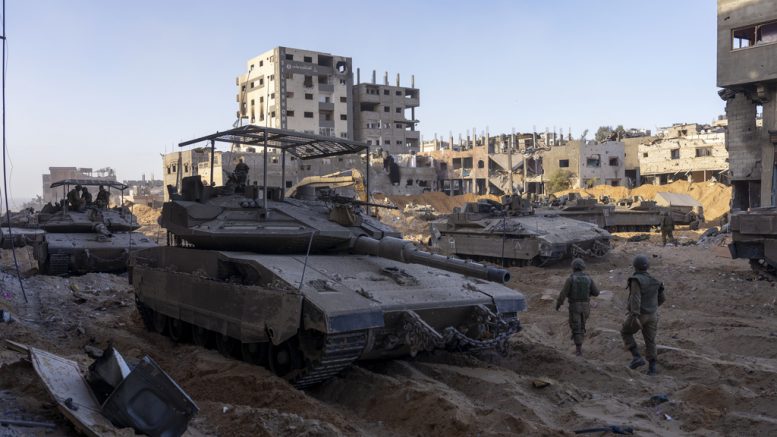KHAN YOUNIS, Gaza Strip (AP) — Israeli strikes pounded Gaza City overnight into Thursday as ground forces battled Hamas militants in dense urban neighborhoods near a hospital where tens of thousands of Palestinians are sheltering.
Gaza’s largest city is the focus of Israel’s campaign to crush Hamas following its deadly Oct. 7 incursion — and the Israeli military says Hamas’ main command center is located in and under the Shifa Hospital complex. The militant group and hospital staff deny that claim. Troops were around 3 kilometers (2 miles) from the hospital, according to its director.
Amid a drumbeat of international concern over dire conditions inside Gaza, mediators were closing in on a possible deal for a three-day cease-fire in exchange for the release of around a dozen hostages held by Hamas, according to two Egyptian officials, a United Nations official and a Western diplomat.
The deal would also allow a small amount of fuel to enter the territory, which is currently reliant on generators for electricity, for the first time since the war began.
Israeli Prime Minister Benjamin Netanyahu has said any temporary cease-fire would have to be accompanied by the release of hostages. Israel has said around 240 people are held captive, and their plight has galvanized Israeli support for the war despite growing international concerns.
Western and Arab officials gathered in Paris on Thursday to discuss ways of providing more aid to civilians in Gaza, a day after the Group of Seven wealthy democracies, which includes close allies of Israel, called for the “unimpeded” delivery of food, water, medicine and fuel, and for “humanitarian pauses” in the fighting.
The possible cease-fire deal is being brokered by the United States, Egypt and Qatar, a Persian Gulf country that mediates with Hamas.
A senior U.S. official said the Biden administration has suggested Israel tie the length of a pause to a certain number of hostages being released in a formula that could be used for additional pauses. All the officials spoke on condition of anonymity for fear of impacting the delicate, ongoing negotiations.
Israeli Foreign Minister Eli Cohen declined to elaborate on any emerging deal in an interview with army radio, saying “I’d recommend not talking about what we’ve agreed to — it hurts the negotiations.”
BATTLES NEAR SHIFA HOSPITAL
Meanwhile, Israeli ground forces battled near Gaza’s largest hospital, Shifa, where people fleeing the fighting are sheltering alongside patients, according to the hospital’s general director, Mohammed Abu Selmia.
The Israeli military says the complex is a Hamas command center and senior militant leaders are hiding there, using the facility as a shield. Hamas and hospital staff say the military is creating a pretext to strike it.
Scores of wounded people were rushed to Shifa overnight, Abu Selmia told The Associated Press on Thursday. “At dawn, a shell landed very close to the hospital, but thank God only a few people had minor injuries,” he said.
“The conditions here are disastrous in every sense of the word,” he said. “We’re short on medicine and equipment, and the doctors and nurses are exhausted. … We’re unable to do much for the patients.”
International journalists who entered the north on a tour led by the Israeli military on Wednesday saw heavily damaged buildings, fields of rubble and toppled trees along the Mediterranean shoreline.
DETERIORATING CONDITIONS IN GAZA
The trickle of aid entering Gaza from the south is largely barred from going north, which has been without running water for weeks. The U.N. aid office said all the bakeries there have shut down for lack of fuel, water and flour. Hospitals running low on supplies are performing surgeries without anesthesia.
More than two-thirds of Gaza’s population of 2.3 million have fled their homes since the war began, with many heeding Israeli orders to flee to the southern part of the besieged enclave.
But the conditions there are also dire. Israel has continued to strike what it says are militant targets all across the territory. New arrivals from the north are squeezing into homes with extended family, or into U.N. schools-turned-shelters.
The World Health Organization said a lack of clean water and bathing facilities in shelters across Gaza has fueled the spread of infectious diseases, including scabies, lice, chickenpox, skin rash and respiratory illness. It has logged over 33,000 cases of diarrhea since mid-October — more than half among children under 5.
A QUICKENING EXODUS
Still, the exodus from Gaza City and surrounding areas in the north has accelerated in recent days. The U.N. Office for the Coordination of Humanitarian Affairs said 50,000 people fled south on Gaza’s main highway on Wednesday during a daily, hourslong window announced by the Israeli military.
There are clashes and shelling near the road, and evacuees reported seeing corpses alongside it, the U.N. office said. Most are traveling on foot with only what they can carry, many holding children or pushing older relatives in carts.
The Hamas-run Interior Ministry, which has urged Palestinians to stay in their homes, has told media outlets not to circulate footage of people fleeing.
A month of relentless bombardment in Gaza since the Hamas attack has killed more than 10,500 Palestinians — two-thirds of them women and minors, according to the Health Ministry in the Hamas-run territory. More than 2,300 others are believed to have been buried by strikes that in some cases have demolished entire city blocks.
Israeli officials say thousands of Palestinian militants have been killed, and blame civilian deaths on Hamas, accusing it of operating in residential areas and using Palestinian civilians as human shields. Gaza’s Health Ministry does not distinguish between civilians and combatants in its casualty reports.
The occupied West Bank has also seen a surge in violence, with Israel carrying out frequent arrest raids that often spark gunbattles. At least seven Palestinians were killed Thursday during an hourslong raid in Jenin, according to the Palestinian Health Ministry. The military says it has stepped up operations to prevent attacks.
More than 1,400 people have died in Israel since the start of the war, most of them civilians killed by Hamas militants during their initial incursion. Israel says 32 of its soldiers have been killed in Gaza since the ground offensive began.
Palestinian militants have continued to fire rockets into Israel, and some 250,000 Israelis have been forced to evacuate from communities near Gaza and along the northern border with Lebanon, where Israeli forces and Hezbollah militants have traded fire repeatedly.

































